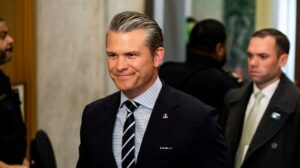The Dictatorship
LSU brought a live tiger to its football game. Guess what happened next.

Before the LSU Tigers played the University of Alabama Crimson Tide Saturday night in Baton Rouge, a cage covered by black fabric was wheeled onto the field of Tiger Stadium. A spotlight was aimed at a curtain that lifted to reveal a Bengal tiger lying in a tiny cage and breathing rapidly. At the sound of the stadium’s frenzied applause, the tiger — named Omar Bradley — stood and showed signs of severe distress: pacing, panting and snarling.
Louisiana Gov. Jeff Landry decided to reintroduce a cruel tradition of bringing a live tiger to games, nearly a decade after that tradition had been ended.
Omar had been forced to travel for hours from Florida for that one moment — because Louisiana Gov. Jeff Landry decided to reintroduce a cruel tradition of bringing a live tiger to games, nearly a decade after that tradition had rightly been ended.
LSU stopped bringing Mike the Tiger to games in 2016 on the advice of the university’s veterinarians. The university’s current mascot, Mike VII, lives in a 15,000-square-foot enclosure adjacent to the stadium and is kept as a living figurehead to be observed by passersby and on a livestream online. But he isn’t put in a cage and wheeled onto the field as Omar was. Previous generations of Mike the Tiger mascots were even dragged to away games and subjected to pranks that included being kidnapped and even being released to wander dangerously around campus (before being shot by tranquilizers and returned to an enclosure).
Fittingly, there was an appropriate and immediate backlash regarding Omar’s appearance at Tiger Stadium. A poll conducted by the Baton Rouge Advocate found that of 1,500 people surveyed, 90% were against having Omar brought to the game. Clearly, the display of Omar offends current sensibilities about holding wild and exotic animals captive for our entertainment.
Omar is reportedly owned by Mitchel Kalmanson of the Worldwide Exotic Animal Agency in Florida. Places that raise, keep and rent out animals such as tigers are neither sanctuaries nor accredited zoos, but often recklessly operated carnival operations that prioritize profit over animal welfare. The federal violations accumulated by Kalmanson involve multiple incidents in which tigers he owned escaped during performances. The Omar episode also highlights the dangers of private ownership of such animals. Congress sought to curb such ownership with its resoundingly bipartisan passage of the Big Cat Public Safety Act in 2022.
Aside from the obvious safety concerns, the public increasingly cares about the plight of animals in general. The use of live animals as props is both outdated and out of favor. People can see that putting living, sensitive animals — whether birds or buffalobulls or big cats — into environments with bright lights and loud noises causes extreme stress. And keeping animals confined and captive for such uses is a recipe for lives of abject misery. The whole system seeks to profit from disregard for and cruelty to animals.
Keeping animals confined and captive for such uses is a recipe for lives of abject misery.
This year, Kalmanson was cited by the U.S. Department of Agriculture for failing to provide records showing that animals in his custody were receiving adequate veterinary care.
Landry’s invocation of “tradition” to justify parading Omar in front of screaming fans was bad enough, but it was also upsetting to see Louisiana Surgeon General Ralph Abraham, a physician and a veterinarian, justify the stunt.
“We had numerous discussions and took every step to ensure this was safe for the tiger. I spent several hours with the tiger last night and you could tell he was comfortable around people and enjoyed the attention,” a statement from Abraham read. “He’s in great health, well cared for by his owners and socially acclimated.”
“As both a veterinarian and medical doctor, I couldn’t think of a better day to literally and figuratively be a tiger.”
That statement showed a total disregard for the conditions that animals need to thrive and live their own autonomous lives. Above all, the officials’ defensive comments suggest that they realized how backward the plan appeared to much of the public.
The confined, unnatural lives of animal mascots are a shadow of what they should be. And to continue to use any animal as a mere symbol without regard for their interests raises the question of who we are as a society, and what kind of people we want to be. That’s the heart of the matter.
No one should resurrect a tradition so demeaning to animals and to ourselves. When we play so whimsically with animals’ lives, or by our silence endorse causing animals such stress and anguish, we all lose — but none more than Omar and countless others like him, caged and wheeled out as a sideshow.
Kitty Block is the president and CEO of the Humane Society of the United States and the CEO of Humane Society International. Block first joined the HSUS as a legal investigator in 1992. She has advised the White House on trade and the environment, and served multiple elected terms on the International Dolphin Conservation Agreement International Review Panel.
The Dictatorship
Trump’s border czar says ‘small’ security force will remain in Minnesota after enforcement drawdown

WASHINGTON (AP) — White House border czar Tom Homan said Sunday that more than 1,000 immigration agents have left Minnesota’s Twin Cities area and hundreds more will depart in the days ahead as part of the Trump administration’s drawdown of its immigration enforcement surge.
A “small” security force will stay for a short period to protect remaining immigration agents and will respond “when our agents are out and they get surrounded by agitators and things got out of control,” Homan told CBS’ “Face the Nation.” He did not define “small.”
He also said agents will keep investigating fraud allegations as well as the anti-immigration enforcement protest that disrupted a service at a church service.
“We already removed well over 1,000 people, and as of Monday, Tuesday, we’ll remove several hundred more,” Homan said. “We’ll get back to the original footprint.”
Thousands of officers were sent to the Minneapolis and St. Paul area for U.S. Immigration and Customs Enforcement’s “Operation Metro Surge.” The Department of Homeland Security said it was its largest immigration enforcement operation ever and proved successful. But the crackdown came under increasing criticism as the situation grew more volatile and two U.S. citizens were killed.

People take part in an anti-ICE protest outside the Governors Residence in St. Paul, Minn., on Friday, Feb. 6, 2026. (AP Photo/Ryan Murphy)
People take part in an anti-ICE protest outside the Governors Residence in St. Paul, Minn., on Friday, Feb. 6, 2026. (AP Photo/Ryan Murphy)
Protests became common. A network of residents worked to help immigrants, warn of approaching agents or film immigration officers’ actions. The shooting deaths of Renee Good and Alex Pretti by federal officers drew condemnation and raised questions over officers’ conduct, prompting changes to the operation.
Homan announced last week that 700 federal officers would leave Minnesota immediately, but that still left more than 2,000 in the state. He said Thursday that a “significant drawdown” was already underway and would continue through this week.
Homan said enforcement would not stop in the Twin Cities and that mass deportations will continue across the country. Officers leaving Minnesota will report back to their stations or be assigned elsewhere.
When asked if future deployments could match the scale of the Twin Cities operation, Homan said “it depends on the situation.”
The Dictatorship
Rubio says ‘no reason’ to doubt Navalny was killed by dart frog poison
ByDavid Rohde
Secretary of State Marco Rubio says there is “no reason” to doubt a new report by five European nations that Russian opposition leader Alexei Navalny was killed in a Russian government prison with poison found in Latin American dart frogs.
A fatal toxin not found naturally in Russia — epibatidine — was “conclusively” discovered in samples of Navalny’s body by a joint investigation conducted by Germany, France, Britain, the Netherlands and Sweden, according to a joint statement by the nations on Saturday.
The toxin is only known to exist in poison dart frogs in Central and South America. One species, the phantasmal poison frog, contains a chemical that is 200 times more potent than morphine.
“It’s a troubling report,” Rubio told reporters at a news conference during a visit to Slovakia on Sunday. “We don’t have any reason to question it.”

It was not clear why the United States did not participate in the investigation of Navalny’s death. But the finding comes amid rising support in the Senate for a bill that would impose sweeping new sanctions against the government of Vladimir Putin, which has been opposed by the Trump administration.
Sen. Jeanne Shaheen, D-N.H., the top Democrat on the Senate Foreign Relations Committee, noted on the closing day of the Munich Security Conference, where Rubio received a standing ovationthat 84 out of 100 senators have signed on to co-sponsor the bill authored by Sen. Lindsey Graham, R-S.C.
“I don’t understand the reluctance to go after Vladimir Putin and what Russia is doing in Ukraine,” Shaheen told a group of reporters. “The failure by the United States to act has extended this war.”
Russian officials have repeatedly denied playing any role in the death of Navalny two years ago in a government-run penal colony in the Arctic. They called the new European report “a Western propaganda hoax,” according to Russia’s state news agency.

The report comes as U.S. envoy Steve Witkoff and Jared Kusher, President Donald Trump’s son-in-law, are expected to meet with both Russian and Iranian officials on Tuesday in Geneva. The goal of the Russia talks is to reach a peace settlement in Ukraine by a June deadline the administration has set. (Witkoff and Kushner are also set to join a second round of nuclear talks with Iranian officials in Geneva on the same day.)
Critics of Trump, who promised to end the war days after returning to office, say Russia has not been seriously negotiating and is simply playing for time so it can gain ground on the battlefield. Democrats have also expressed concerns over reports that Witkoff has been negotiating business deals during peace talks with Kirill Dmitriev, a former Wall Street banker who runs Russia’s sovereign wealth fund.
Last week, Ukrainian President Volodymyr Zelenskyy said that Dmitriev pitched $12 trillion in bilateral economic agreements with the U.S. It is unclear how such large deals could be achieved. The $12 trillion figure is about four times the size of Russia’s 2025 gross domestic product.
A European diplomat whose country has negotiated with Russia in the past told MS NOW that Moscow has repeatedly made such investment offers. But the business entities end up being largely Russian controlled. “They lure you in,” said the diplomat, who was granted anonymity to speak candidly.
Shaheen expressed skepticism as well.
“I’m concerned about all things Russian in this administration,” Shaheen said. “I’m not a conspiracy theorist. But I’m beginning to become one with respect to Putin and President Trump.”

David Rohde
David Rohde is the senior national security reporter for MS NOW. Previously he was the senior executive editor for national security and law for NBC News.
The Dictatorship
FBI links glove found near Nancy Guthrie’s home to suspect on video
A glove with DNA found near 84-year-old missing Nancy Guthrie’s home appears to match those worn by a masked person caught on surveillance footage, the FBI said Sunday.
“The FBI received preliminary results yesterday on 2/14 and are awaiting further testing,” the bureau said in a statement. “This process typically takes 24 hours from when the FBI receives DNA.”
The FBI said investigators collected “approximately 16 gloves in various areas near” Guthrie’s house in Tucson, Arizonawhere she was last seen on Jan. 31. Most of those gloves were “searchers’s gloves that they discarded in various areas when they searched the vicinity” but the glove with the “DNA profile recovered is different and appears to match the gloves of the subject in the surveillance video,” the FBI said.
“What we have is a lead here. The glove retrieved would need to have the victim’s DNA or some other forensic material to tie it to the home,” a law-enforcement source familiar with the investigation cautioned. “It must be connected to the home and victim. That would make the glove actual evidence, at this point it’s a lead. A good lead.”

The FBI said said the glove was found in a field approximately two miles from Guthrie’s house. The glove resembles the one on the hand of a person who was captured on porch camera video footage at the home of NBC “Today Show” host Savannah Guthrie’s mother the night she went missing.
The agency said it is awaiting quality control and official confirmation before putting the individual’s profile into the bureau’s national database, which could take up to 24 hours.
The FBI has described the man captured in photographs and on video as approximately 5’9”-5’10” with an average build. In addition to gloves, he was also seen wearing a ski mask and a black, 25-liter “Ozark Trail Hiker Pack” backpack. The agency on Thursday increased its reward for any information leading to an arrest and conviction of anyone involved in Guthrie’s disappearance to $100,000.
Guthrie was reported missing by her family on Feb. 1. Sheriff’s deputies also found blood on the front porch that was later confirmed to belong to the network host’s mother. Guthrie’s children, including Savannah, have posted several videos pleading for their mother’s release, agreeing to pay any ransom demanded and asking for help from the public.
Alex Tabet, Marc Santia and Ken Dilanian contributed to this report.
Erum Salam is a breaking news reporter and producer for MS NOW. She previously was a breaking news reporter for The Guardian.
-

 The Dictatorship1 year ago
The Dictatorship1 year agoLuigi Mangione acknowledges public support in first official statement since arrest
-

 Politics12 months ago
Politics12 months agoFormer ‘Squad’ members launching ‘Bowman and Bush’ YouTube show
-

 The Dictatorship5 months ago
The Dictatorship5 months agoMike Johnson sums up the GOP’s arrogant position on military occupation with two words
-

 Politics12 months ago
Politics12 months agoBlue Light News’s Editorial Director Ryan Hutchins speaks at Blue Light News’s 2025 Governors Summit
-

 Politics12 months ago
Politics12 months agoFormer Kentucky AG Daniel Cameron launches Senate bid
-

 The Dictatorship1 year ago
The Dictatorship1 year agoPete Hegseth’s tenure at the Pentagon goes from bad to worse
-
Uncategorized1 year ago
Bob Good to step down as Freedom Caucus chair this week
-

 Politics10 months ago
Politics10 months agoDemocrat challenging Joni Ernst: I want to ‘tear down’ party, ‘build it back up’






